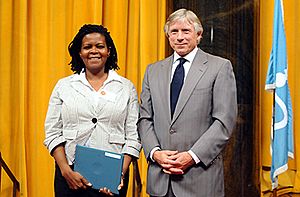Annette Gordon-Reed facts for kids
Quick facts for kids
Annette Gordon-Reed
|
|
|---|---|

Gordon-Reed in 2011
|
|
| Born |
Annette Gordon
November 19, 1958 Livingston, Texas, U.S.
|
| Education | Dartmouth College (BA) Harvard University (JD) |
| Occupation | Professor, author, historian |
| Employer | Harvard Law School Harvard University Radcliffe Institute for Advanced Study |
| Known for | American Legal History, American Slavery and the Law |
| Spouse(s) | Robert Reed |
| Children | 2 |
| Awards | National Book Award for Nonfiction, MacArthur Fellowship, Pulitzer Prize for History |
Annette Gordon-Reed (born November 19, 1958) is an American historian and law professor. She teaches at Harvard University. She is known for her important work on Thomas Jefferson and his relationship with Sally Hemings and her children.
In 2009, she won the Pulitzer Prize for History and the National Book Award for Nonfiction. She also received 15 other awards for her book about the Hemings family of Monticello. In 2010, she was given the National Humanities Medal and a MacArthur Fellowship.
Contents
Early Life and Education
Annette Gordon-Reed was born in Livingston, Texas. She grew up in Conroe, Texas, during a time called Jim Crow. This was when laws kept Black people and white people separate. She was the first Black child to attend her elementary school.
When she was in third grade, she became very interested in Thomas Jefferson. She later graduated from Dartmouth College in 1981. Then, she went to Harvard Law School and finished in 1984.
Family Life
Annette Gordon-Reed is married to Robert R. Reed. He is a judge for the Supreme Court of the State of New York. They met when they were both studying at Harvard Law School.
She lives in New York City with her husband. They have two children named Gordon and Susan.
Career as a Professor and Historian
Annette Gordon-Reed started her career working in law. She later became a professor. She taught at New York Law School and Rutgers University.
In 2010, she joined Harvard University. She became a professor of both history and law. She also worked at the Radcliffe Institute for Advanced Study. In 2014, she was a visiting professor at Oxford University in England.

Her First Book: Thomas Jefferson and Sally Hemings: An American Controversy (1997)
Her first book looked into a long-standing historical question. This question was whether Thomas Jefferson was the father of children with his enslaved woman, Sally Hemings. For a long time, many historians believed that Jefferson's nephew was the father.
Gordon-Reed carefully studied old records and writings. She looked at what historians had said before. She found that some historians had made assumptions. These assumptions often favored white people's stories over Black people's stories.
She checked the stories told by former enslaved people from Monticello. These included Madison Hemings, who said Jefferson was his father. She compared these stories with official documents. She also looked at family stories from Hemings' descendants.
Gordon-Reed showed that Jefferson was at Monticello when Sally Hemings' children were conceived. She also noted that all of Sally Hemings' children were freed. They were the only enslaved family to gain freedom in this way. This matched what Madison Hemings said Jefferson had promised his mother. Gordon-Reed concluded that Jefferson was indeed the father of Sally Hemings' children.
How Her Book Changed History Thinking
Gordon-Reed used her legal training to understand the old documents. She helped historians look at the evidence in a new way. Her work was called "brilliant" by writer Christopher Hitchens.
Her book encouraged more research on this topic. In 1998, a DNA study was done. It showed a match between Jefferson's male family line and a descendant of Eston Hemings. This study, along with the historical evidence, strongly suggested that Thomas Jefferson was the father of the children.
Vernon Can Read! (2001)
This book is about the life of Vernon Jordan, a civil rights leader. Annette Gordon-Reed wrote it with him. It tells his story from childhood up to the 1980s. The book won an award for Best Nonfiction Book in 2001.
The Hemingses of Monticello: An American Family (2008)
In 2008, Gordon-Reed published this book. It was the first part of a two-book series. It tells the story of the Hemings family who lived at Monticello. She showed the lives of Elizabeth Hemings' many descendants.
This book was highly praised. It was important because it focused on an enslaved family's story. It won the Pulitzer Prize for History and 15 other awards.
Andrew Johnson (2011)
In 2011, Gordon-Reed wrote a book about Andrew Johnson. He was a U.S. president after the Civil War. She wrote about his actions regarding formerly enslaved people. She noted that he did not support their full freedom and equality.
Gordon-Reed suggested that many problems for African Americans could have been avoided. She believed they should have been given land to farm. Without land, many became sharecroppers. This meant they worked on land owned by others. They often had very few choices and faced economic hardship.
Awards and Special Recognition
Annette Gordon-Reed was the first African American to win the Pulitzer Prize for History. She won it for her 2008 book about the Hemings family. She received 15 other awards for that book.
- 2008
- 2009
- Pulitzer Prize in History
- George Washington Book Prize
- Anisfield-Wolf Book Award
- Frederick Douglass Prize
- 2010
- President Barack Obama honored her with the National Humanities Medal. This is a top national award for arts and humanities.
- She received a MacArthur Fellowship. This award recognized how her research changed what people thought about Thomas Jefferson.
She also received a Guggenheim Fellowship in 2009. In 2020, she was named a University Professor at Harvard University. This is Harvard's highest honor for its professors. In 2021, she became a corresponding fellow of the British Academy. In 2022, she was named a Distinguished Teaching Fellow by the Georgia Historical Society. This honor recognizes leaders in history who are great writers and educators.
 | Charles R. Drew |
 | Benjamin Banneker |
 | Jane C. Wright |
 | Roger Arliner Young |

